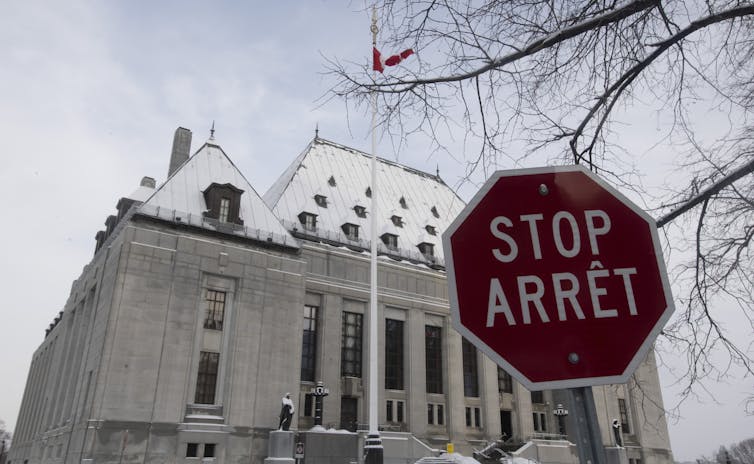![]() This seemingly banal article is extremely important as it demonstrates how corporations are misusing human rights laws to defend their financial interests.
This seemingly banal article is extremely important as it demonstrates how corporations are misusing human rights laws to defend their financial interests.

THE CANADIAN PRESS/Adrian Wyld
Jennifer Quaid, L’Université d’Ottawa/University of Ottawa
In January 2020, the Supreme Court of Canada heard a case that made headlines because it raised a provocative question: Can corporations be subject to cruel and unusual punishment.
While the question might strike the ordinary person as amusing, by the time the Attorney General of Québec vs. 9147-0732 Québec Inc. case arrived at Canada’s top court, the stakes were high. That’s because some established elements of corporate and criminal law were thrown into doubt when the case was decided by a 2-1 majority) of the Québec Court of Appeal in favour of a Québec contracting company.
The company had challenged what it thought was an unreasonably high mandatory minimum fine that it claimed could push it into bankruptcy. It argued the fine, upwards of $30,000, was an over-the-top consequence for doing renovation work without a permit contrary to the province’s Building Act.
In order to support its claim that the fine fit within the criteria for Section 12 of the Canadian Charter of Rights and Freedoms — namely that it was grossly disproportionate — the company argued it was cruel because a bankruptcy would have a significant negative impact on shareholders and employees who depended on the business for their livelihoods.
Big stretch
This argument seemed a big stretch based on current law. It was surprising therefore when two of three Québec Court of Appeal judges agreed with the company, finding that nothing in the text of Section 12 precluded the inclusion of corporations.
The majority held that the protection against cruel and unusual punishment is not inextricably tied to protecting human beings from degrading and inhumane treatment. They did not see a problem with extending protection to corporations if penalties inflict damage on the people involved with a corporation.
The dissenting judge disagreed and said that the long history of the protection against cruel and unusual punishment showed that the very core of Section 12 is about protecting human dignity.
The Supreme Court justices agreed with the dissenting Québec judge and unequivocally rejected the notion that Section 12 could ever apply to non-human entities. In support of its ruling, the court referred to several landmark cases decided in the early days of the Charter, including the 1987 decision of Irwin Toy Ltd vs. Attorney-General of Québec.
In the more recent case, the Supreme Court ruled:
“Simply put, the text ‘cruel and unusual’ denotes protection that ‘only human beings can enjoy’ …. The protective scope of Section 12 is thus limited to human beings …. And the existence of human beings behind the corporate veil is insufficient to ground a Section 12 claim of right on behalf of a corporate entity, in light of the corporation’s separate legal personality.”
The court also rejected the argument that the impact on a company’s stakeholders should be considered when determining the scope of Section 12.
Shuts the door to future challenges
The ruling is important.
First, by firmly closing the door to Section 12 challenges by corporations, we avoid injecting unnecessary uncertainty into the prosecution of corporations for regulatory offences. Many of those offences carry significant fines, limited to corporations, as a means of promoting greater compliance with laws designed to protect the public interest, such as those mandating workplace health and safety standards and environmental protections.

THE CANADIAN PRESS/Adrian Wyld
Second, by rejecting the notion that the prospect of bankruptcy (and its effects on people) is relevant to Section 12, the Supreme Court has indirectly affirmed a key principle of corporate sentencing established in 2013 by the Ontario Court of Appeal in the Metron case.
Metron was a construction company prosecuted for criminal negligence causing death following the collapse of a swing stage on a construction site in Toronto in December 2009. Four men died and one was permanently disabled because they were not wearing lifelines as required by law. Metron pleaded guilty, but the Crown and defence disagreed significantly on the amount of the fine.
The trial court imposed a lower fine in part because of the company’s poor financial situation. The Ontario Court of Appeal disagreed, ruling that the risk of bankruptcy is irrelevant when deciding what amount of fine is an appropriate punishment. The Supreme Court’s ruling on the Québec contracting company therefore nips in the bud the doubt the Québec Court of Appeal decision had cast upon the Metron decision.
Finally, by concluding that a corporation couldn’t point to the collateral damage a fine might cause to its employees and other stakeholders to make its case, the Supreme Court has clearly adhered to the current state of corporate law that disregards corporate personality only in rare circumstances.
By doing so, the Supreme Court has quelled any fears that this case might weaken this cornerstone principle of corporate law, including under the Canada Business Corporations Act, by blurring the normally sharp line drawn between the corporation and its human stakeholders.
Jennifer Quaid, Associate Professor, Civil Law Section, Faculty of Law, L’Université d’Ottawa/University of Ottawa
This article is republished from The Conversation under a Creative Commons license. Read the original article.


Be the first to comment